2015-2016 HASTAC Scholars
Mollie Ables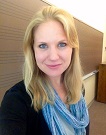
Ph.D. Candidate
Musicology
Project: Networks of Musicians at Sacred Institutions in Late Seventeenth-Century Venice
My dissertation examines networks of musicians in Early Modern Venice, focusing on the career of the composer Giovanni Legrenzi. Legrenzi worked for several prominent Venetian institutions from the early 1670s to his death in 1690, and ultimately was appointed to the most prestigious musical posts in the city. The musicians he worked with also served multiple institutions, either simultaneously or in succession, and their relationships with other musicians, patrons, and administrators often facilitated their movement between institutions. Legrenzi’s Venetian career presents an excellent case study of these musical connections in late seventeenth-century Venice, and studying these connections will demonstrate how networks of musicians functioned in this time period.
I am examining approximately 1,500 documents, mostly unpublished, from the Venetian institutions where Legrenzi was active between 1670 and 1690. I am primarily working with payment, hiring, and termination records, which document the activity of the musicians active in these institutions. Working on an extension of TEI, I am transcribing the documents and enriching them with semantic markup and annotations in order to make the data discoverable and further processable to reveal the complex relations between people and institutions. I also hope to work with different platforms to enable a graphic represenation of the musicians’ networks over a timeline. This project will be the foundation of a more extensive project of a web-based repository on musicians and musical activity in Early Modern Venice, and will hopefully benefit other scholars conducting similar archival research.
Mary Borgo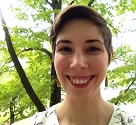
Ph.D. Candidate,
Department of English
Project: Virtually Victorian: From Type-writer Girls to Magic Lantern Shows
Mary’s work explores the ways in which virtual environments can recreate or simulate Victorian performance media, reading experiences, and working-class culture. Her most recent efforts include two projects, the first of which is a citizen science project which is being developed through collaboration with Dr. Karen Bourrier (University of Calgary) and Dr. Edith Law (University of Waterloo). The game asks users to imagine themselves as typewriter girls working in late-Victorian London in order to complete a range of transcription tasks. As gamers progress, they will gain paleography skills while learning more about the lives of these working women and about the historical figures who authored the materials that they are transcribing. The second project stems from her dissertation on the magic lantern shows and missionaries. She hopes to create an interactive map of performances that included a magic lantern in order to visualize broader trends in Victorian screen culture.
Niki Fritz
Ph.D. Candidate
Media School
Project: Transmen use of crowdsourcing and its implications for identity and privacy concerns
Ms. Niki Fritz is currently working on an interdisciplinary project that investigates the identity shift and privacy concerns of transmen who use crowdsourcing to raise funding for top surgeries. Twenty transmen or queer-identified individuals were interviewed in a semi-structured format. In addition to exploring financial gains and possible privacy concerns, including privacy wagers online, Fritz is investigating how the experience shaped and shifted participant’s self-concept in potentially beneficial ways. She hopes the project will shed light on how an under-represented community uses crowd-sourcing as well potentially helping future minority individuals navigate the online crowdsourcing realm.
David K. Kloster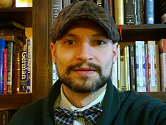
MLS Student
School of Informatics and Computing
Project: William of Tyre: A History of Deeds Done Beyond the Sea
William of Tyre is arguably the most used primary source by Crusade historians. His history of the Kingdom of Jerusalem offers many first hand accounts of the events that transpired in the Levant prior to William’s death in 1186. My project entails creating a website with a digitized version of the English translation of A History of Deeds Done Beyond the Sea, which was translated by Emily Babcock and A.C. Krey. The website will also include an interactive map with the locations and events discussed in William’s account of the Kingdom of Jerusalem. In the future I would also like to add information regarding the various personalities and institutions he mentions. Eventually I would also like to include a transcription of the original Latin text alongside the English translation. I hope this site will be used as a research and teaching tool.
Whitney Sperrazza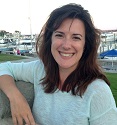
Ph.D. Candidate
Department of English
Project: Feeling Violation: Digital/Physical Approaches to Sexual Violence
My project asks how we can use digital tools and methods to help readers gain new critical perspectives on literary representations of sexual violence and the writing and reading bodies interacting with those representations. Heavily influenced by feminist methodologies, I focus on the bodies behind literary texts, specifically how those bodies can be represented using digital interventions and innovations. My current approach to these larger inquiries focuses on stage directions in Renaissance drama, particularly those that direct an actor's body in relation to a sexually violent act. How can digital tools help readers more viscerally experience the demands placed on an actor's body in such moments? To answer questions like this, I will in part examine my primary texts using quantitative analysis methods, mainly to discover what our quantitatively driven tools obscure as they convert a text into data.
I will also turn to humanist and fine arts methodologies often outside the scope of digital literary studies to experiment with alternative approaches to interacting with a text. For instance, can we experience the demand on an actor's body more viscerally if we can engage with a text's violent language tactilely rather than visually or aurally? In this vein, I have already done some work with 3D modeling and laser cutting to produce 3D objects that tactilely render the violence of a text's language—allowing the reader to feel, rather than simply see, the violence. Moving forward, I hope to incorporate performance art components that will ask readers to engage physically and kinesthetically with a text. By incorporating these interdisciplinary approaches to the texts I study, my digital project is a response to distant reading and big data methods currently prevalent in digital literary studies, and aims to demonstrate the exciting possibilities of increasingly interdisciplinary digital agendas.
Grace Thomas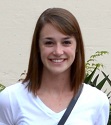
MLIS Student
School of Informatics and Computing
Project: Building a Comic Book Readership Digital Archive
Dr. John Walsh's Comic Book Readership Archive project, or CoBRA, proposes to build a digital archive—of primary source material and related data sets—to document, compile, and analyze American comic book readership and fandom. The archive will include content from such sources as: fan mail, fan club publications and membership rolls, contests sponsored by publishers and fan clubs, fanzines, and programs and attendee records from comic book conventions and similar events. The project will provide access to a large and growing archive for the study of comic book readership and will facilitate new research questions about comic books expressed in new forms of scholarship such as interactive maps, timelines, network graphs, other information visualizations, and computationally-assisted content and data analysis. My work on the COBRA project involves designing and implementing the MySQL foundational database, data entry interface, and APIs; general project management and training of fellow student workers; and further data analysis and visualization of the future information stored in the database.
Andrew Thompson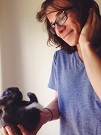
BA Student
Departments of Folklore & Ethnomusicology and Physics
Project: On Mapping the Digital Geopsychic
The human ability to recreate physical spaces within their own mind has been well documented throughout the ages, and recent advances in neuroscience and psychology have allowed for concrete answers to some of the mechanistic questions that have risen. With the advent of the internet, this peculiar facet of the human animal is granted another layer of context: a responsive, dynamic simulacrum of reality that practically begs to be mapped out within the psyche. In prior research on this subject of translational mapping I have referred to the created mental space as ‘the geopsychic’; in most cases, certain key aspects of the physical space will trigger this recreation. These aspects are quite varied, but four large categories of a shared space can be defined with some ease (included with definitions, examples of real-space and digital space): 1) Social (i.e. Town Square, Festival, Facebook, OkCupid), 2) Market (i.e. Granary, Grocery Store, Amazon, Etsy); 3) Archive (i.e. Museum, Gallery, Google Books, JStor); 4) Wilds (i.e. Second-hand Store, Brothel, Pornography, ‘Deep Web’).
The focus of my proposed research is to better understand the aforementioned mapping of the geopsychic in regards to digital space. I propose to undertake this primarily through analysis of web traffic: another intriguing parallel to the study of pilgrimage(s) affiliated with translational mapping of real-space. Specifically, I would like to utilize word searches and traffic data for this purpose. As the subject matter is geographical in theory (reflected in much of the language; i.e. ‘traffic’), I am considering aggregating the data into some variety of graphical map. Preferably, this would show the interrelation between the listed archetypal spaces, giving a more cohesive view of ‘digital space’.








